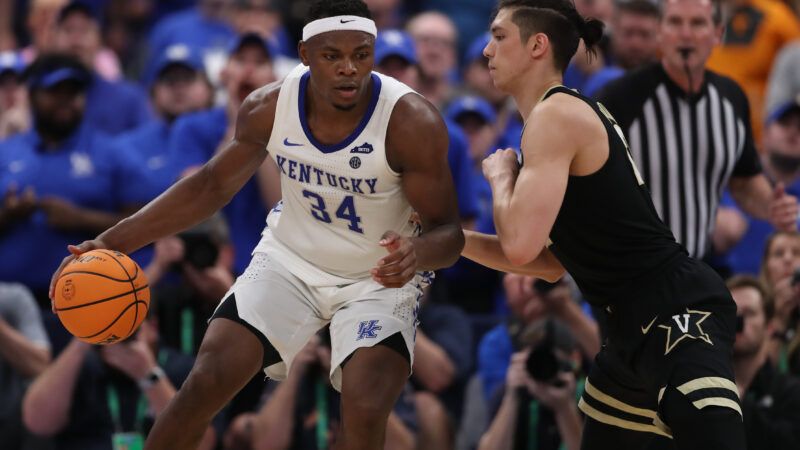America's Best College Basketball Player Might Earn $2 Million Without Going Pro
Now that the NCAA can't stop student-athletes from making money, it can pay to stay in school.

The best college basketball player in America will stay in school for his senior season and get paid for doing so—thanks to some recent changes to National Collegiate Atheltic Association (NCAA) rules that have opened up markets and opportunities for student-athletes.
For Congolese immigrant and University of Kentucky basketball star Oscar Tshiebwe, those changes mean the potential to earn millions of dollars next year without going pro.
Tshiebwe announced Thursday that he would forgo the upcoming National Basketball Association (NBA) draft to finish his college career at Kentucky. It's the first time since 2008 that the winner of the John R. Wooden Award, which is given out annually to the best college basketball player in the country, has declined to immediately depart for the NBA.
But outstanding student-athletes of the recent past have not had the same financial opportunity that Tshiebwe does, thanks to the NCAA's recent decision to let players cash in on endorsement deals using their name, image, and likeness (usually abbreviated as "NIL"). Though college players are not directly paid for their talents, they are allowed to profit off NIL deals in the same way they've always benefitted from scholarships. For a player like Tshiebwe, these new opportunities can be quite lucrative, as Stadium basketball writer Jeff Goodman notes:
Oscar Tshiebwe will likely earn in the neighborhood of $2 million this season through NIL, source told @Stadium. https://t.co/MHlbaJa7RO
— Jeff Goodman (@GoodmanHoops) April 20, 2022
Prior to NIL deals being legalized, college players with the talent to play professional basketball were foolish not to make the jump to the next level. Coming back for another season at school meant uncompensated work and the risk of an injury that might reduce or eliminate their hopes of playing in the NBA.
The erosion of the NCAA's cartelized control over student-athletic revenue has created a more dynamic set of choices for players like Tshiebwe. Though he was undeniably the best player in college basketball this year—in 34 games, he recorded 28 double-doubles (basketball lingo for games in which a player scores at least 10 points and at least 10 rebounds), including 16 in a row at one point—most experts projected Tshiebwe to be a second-round draft pick, largely due to the different skill sets required to excel in the college and professional versions of the sport.
Staying in school for another year, and getting compensated for it, means Tshiebwe will get to further develop those skills in the hopes of a larger payday in next year's draft. It also means another shot at a national championship, after Kentucky was stunningly eliminated from this year's "March Madness" by Saint Peter's College, the Cinderella story of the tournament.
"That's not how I wanted it to end," Tshiebwe told ESPN. "It's the best motivation."
He's not the only student-athlete getting what they deserve from the NCAA's new rules—which have created some weird and wonderful results. Doug Edert, who became the star of Saint Peter's upset run in March, landed an endorsement deal with Buffalo Wild Wings. A University of Arkansas wide receiver earned a deal for his dog, Blue. An offensive lineman for Ohio State is getting paid to hawk, yes, scented candles. And Louisiana State gymnast Olivia Dunne has reportedly leveraged her massive social media following into NIL deals worth over $1 million.
Even the NCAA—which for years fought the idea of letting players profit off NIL deals as it sold players' likenesses to video game companies and sold jerseys with players' numbers on them—is a winner here. By staying in school, Tshiebwe gives college basketball "a rare win for the sport in the talent tug-of-war with the NBA," writes Sports Illustrated's Pat Forde. "So this is a win-win for college hoops as a whole and Tshiebwe in particular. He has established marketability in a place that loves its college basketball heroes. Put his face on billboards on New Circle Road in Lexington. Let him sign autographs at Keeneland Race Course. If he likes the steaks at Malone's, have him endorse those. Pay the man for being the star Wildcat he is."
Mainly, this is a story about how opening up markets benefits everyone. Well, everyone except perhaps the college teams that end up facing the brunt of Tshiebwe's revenge tour next season.


Show Comments (26)